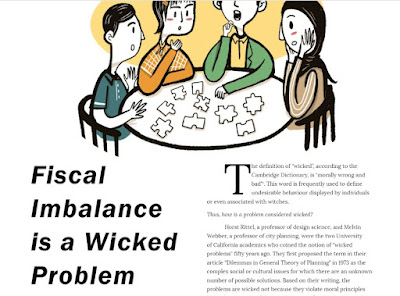Fiscal Imbalance is a Wicked Problem
The
definition of “wicked”, according to the Cambridge Dictionary, is "morally
wrong and bad"[1].
This word is frequently used to define undesirable behaviour displayed by
individuals or even associated with witches.
Thus, how is a problem considered wicked?
Horst
Rittel, a professor of design science, and Melvin Webber, a professor of city
planning, were the two University of California academics who coined the notion
of "wicked problems" fifty years ago. They first proposed the term in
their article "Dilemmas in General Theory of Planning" in 1973 as the
complex social or cultural issues for which there are an unknown number of
possible solutions. Based on their writing, the problems are wicked not because
they violate moral principles but rather because of the way they are defined
and addressed—they are "vicious," "tricky," and
"complicated"[2].
The term, however, had only gained popularity in the 21st century since policymakers realised that particular issues, like inequality, poverty, education, and climate change, cannot be solved by a single best approach. In contrast to "simple" or "tame problems” that have specific solutions, "wicked problems" have the potential to grow or change, and the more we try to solve a problem, the more it becomes apparent to us[3].
After
more than two decades of fiscal decentralisation, now we are implementing Law
No. 1 of 2022. We acknowledge that to reduce fiscal imbalances, we
have been making numerous changes to policies and solutions. Every attempt is
considered valid, so there is no right or wrong answer. The policies are now
output-oriented instead of input-oriented. After experimenting with
proportionate allocations, we will now use performance-based allocation. The
earmarking component has been added to the general allocation grant concept
through redesign. We are encouraging local governments to increase their
ability to levy local taxes and increase their quality of spending. Some
solutions may not work—that is a wicked problem—while other solutions may be
examined and show additional issues that need to be resolved. Some local
governments have been successful, while others continue to underperform. As a result, the number of solutions to solve
is limitless; it is the journey and never-ending learning.
Moreover,
fiscal imbalances may be the sign of a larger issue; these issues may include
infrastructure, governance, education, human resource capacity, and income
inequality. It would be crucial to understand how one issue affects fiscal
imbalance in order to prioritise and identify the issues that need to be
resolved first. The issue of fiscal imbalance is multifaceted, and
collaboration is crucial. To address any related issue, we require multiple
solutions from multiple stakeholders. A wicked problem is a shared problem that
cannot be comprehended or resolved from a single point of view. The same goes
for solving it – it can only be tackled as a shared solution.
Recently,
at least two methods have been proposed to address the wicked problem. The
first way is through collaborative strategy or co-creation. One government or
one organisation could not address all of the problems we were facing. They
required and fostered cross-sector and cross-agency thinking. The second is to
never stop innovating and to concentrate on promoting the knowledge and
insights gained from tackling wicked problems both inside and across public
sector organisations.
Recognising that we are faced with a wicked problem allows us to develop policies in a more innovative and cooperative manner. We saw it could be done. And now, we are ready to do more.
This article has been published in Media Defis Edition XXXVI-2023.




Comments